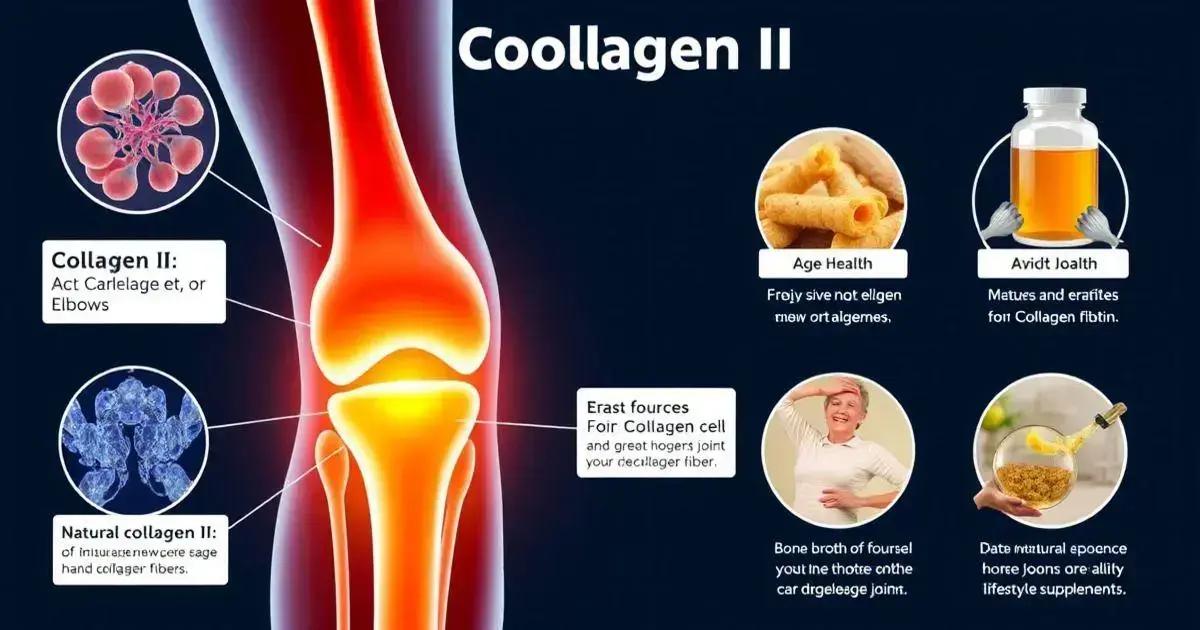Type II collagen is a vital protein found in cartilage that plays a key role in joint health by providing pain relief, reducing inflammation, and supporting cartilage regeneration. It is generally safe for most individuals, but consulting a healthcare provider before starting supplementation is advisable, especially for those with existing health conditions or medications. Incorporating type II collagen into your routine can significantly enhance joint health and improve overall quality of life.
Collagen II is a specific type of collagen predominantly found in cartilage, making it essential for maintaining joint health and function. As we age, the natural production of collagen II decreases, leading to discomfort and stiffness in the joints. In this article, we will explore the benefits of collagen II, its sources, and how to effectively incorporate it into your health regimen.
What is Collagen II?
What is Collagen II?
Collagen II is a specific type of collagen that is predominantly found in hyaline cartilage, which is the smooth tissue that covers the ends of bones in joints. It is the main component of articular cartilage, which helps maintain the structure and function of joints, allowing for smooth movement between bones.
This type of collagen is crucial for joint health because it helps absorb shock and maintain the elasticity of cartilage. Unlike Type I collagen, which is primarily found in skin, tendons, and bones, Type II collagen is specifically designed to meet the unique needs of joint cartilage.
As we age, the body’s natural production of collagen II decreases, which can lead to joint pain, stiffness, and conditions such as osteoarthritis. This decline highlights the importance of maintaining adequate levels of collagen II for supporting joint health.
Type II collagen can be sourced from various animal tissues, particularly from chicken sternum or bovine cartilage, and is available in different forms, including powders, capsules, and liquid extracts. It is commonly used in dietary supplements aimed at supporting joint health and alleviating discomfort.

Health Benefits of Collagen II
Health Benefits of Collagen II
Collagen II offers several significant health benefits, particularly for joint health and overall well-being. Here are some key benefits associated with collagen II:
- Supports Joint Health: Collagen II is essential for maintaining the structure and integrity of cartilage, which cushions joints. Supplementing with collagen II can help support joint health and reduce the risk of cartilage degeneration.
- Reduces Joint Pain: Research indicates that collagen II may help alleviate joint pain, particularly in individuals suffering from osteoarthritis and rheumatoid arthritis. By supporting cartilage health, it can lead to reduced discomfort during movement.
- Improves Mobility: By enhancing joint lubrication and reducing inflammation, collagen II can help improve overall mobility and flexibility, which is especially beneficial for individuals who experience stiffness in their joints.
- Promotes Cartilage Regeneration: Collagen II has been shown to stimulate the production of cartilage cells, promoting the regeneration and repair of damaged cartilage, which is vital for joint health.
- Reduces Inflammation: Collagen II may help modulate the body’s inflammatory response, leading to decreased inflammation in the joints, resulting in less pain and improved functionality.
- Supports Overall Bone Health: In addition to its benefits for cartilage, collagen II may also contribute to bone health by enhancing bone density and strength, further supporting joint stability.
Incorporating collagen II into your health regimen can provide these benefits, making it a valuable supplement for those looking to support joint health and alleviate discomfort. However, it’s essential to consult with a healthcare provider before starting any new supplement.
Sources of Collagen II
Sources of Collagen II
Collagen II can be obtained from various dietary sources and supplements. Understanding these sources can help individuals ensure they are getting enough collagen II to support their joint health. Here are some key sources of collagen II:
- Animal Sources:
- Chicken Cartilage: One of the richest sources of collagen II, chicken cartilage is often used in supplements and can be found in the sternum of the chicken.
- Bovine Cartilage: Cartilage derived from cows is another significant source of collagen II and is commonly used in dietary supplements.
- Collagen II Supplements:
- Hydrolyzed Collagen: Many collagen supplements on the market contain hydrolyzed collagen, which has been broken down into smaller peptides for easier absorption. Look for products specifically labeled as containing Type II collagen.
- Type II Collagen Powders: These are concentrated forms of collagen II that can be easily mixed into smoothies, beverages, or foods.
- Bone Broth:
Bone broth made from chicken or beef bones and cartilage can provide a natural source of collagen II, along with other beneficial nutrients.
Incorporating both dietary sources and supplements can help individuals maintain adequate levels of collagen II, supporting their joint health and overall well-being.

How to Supplement with Collagen II
How to Supplement with Collagen II
Supplementing with collagen II can be an effective way to support joint health and alleviate discomfort associated with conditions like osteoarthritis and rheumatoid arthritis. Here are some guidelines on how to effectively supplement with collagen II:
- Choose the Right Supplement: Look for high-quality supplements specifically labeled as containing Type II collagen. These may come in various forms, including powders, capsules, and liquid extracts.
- Follow Recommended Dosages: The typical dosage for collagen II supplements generally ranges from 40 mg to 600 mg per day. Many studies suggest a dosage of around 40 mg to 60 mg per day for joint health benefits.
- Take with Food: For optimal absorption and to minimize any potential gastrointestinal discomfort, it is recommended to take collagen II with meals.
- Incorporate into Your Diet: If using powdered forms of collagen II, consider mixing it into smoothies, soups, or other foods to make it easier to consume regularly.
- Be Consistent: For best results, take collagen II supplements consistently over time. Many individuals may start to notice improvements in joint pain and mobility within a few weeks, but optimal benefits may take several months of regular use.
- Pair with Nutrients that Support Collagen Production: Consider combining collagen II supplementation with nutrients that promote collagen synthesis, such as vitamin C, zinc, and copper, to enhance overall effectiveness.
By following these guidelines for supplementing with collagen II, individuals can effectively enhance their collagen levels and support their joint health safely and beneficially.
Recommended Dosage and Usage
Recommended Dosage and Usage
When supplementing with collagen II for joint health, it’s important to follow appropriate dosage and usage guidelines to ensure its effectiveness and safety. Here are some recommendations:
- Typical Dosage: The common dosage for collagen II supplements generally ranges from 40 mg to 600 mg per day. Many studies suggest a dosage of around 40 mg to 60 mg per day for joint health benefits.
- Forms of Collagen II: Collagen II is available in various forms, including capsules, tablets, powders, and liquid extracts. Choose the form that is most convenient for you and fits easily into your daily routine.
- Timing of Doses: For optimal results, it is recommended to take collagen II with meals to enhance absorption. If using powdered forms, consider mixing it into smoothies, water, or other beverages.
- Duration of Use: Collagen II can be taken for both short-term and long-term purposes. While some individuals may notice improvements in joint pain and mobility within a few weeks, continued use over several months may be necessary for sustained benefits.
- Consult a Healthcare Provider: Before starting any new supplement, especially if you are pregnant, nursing, or have underlying health conditions, consult with a healthcare provider. They can help determine the appropriate dosage and ensure that it won’t interact with any medications you may be taking.
By adhering to these dosage and usage recommendations, you can effectively incorporate collagen II into your health regimen and enjoy its numerous benefits safely.
Conclusion
Type II collagen is a vital protein that plays a crucial role in maintaining joint health and function.
Its numerous benefits, including pain relief, inflammation reduction, and support for cartilage regeneration, make it a valuable supplement for those seeking to enhance their joint health and overall well-being.
Understanding how type II collagen works in the body, following recommended dosages, and being aware of potential side effects are essential steps for safe and effective use.
While generally safe for most individuals, it is important to consult with a healthcare provider before starting any new supplement, especially if you have existing health conditions or are taking medications.
By responsibly incorporating type II collagen into your health regimen, you can leverage its therapeutic benefits to support your joints and promote a more active and fulfilling lifestyle.
FAQ – Frequently Asked Questions about Type II Collagen
What is type II collagen?
Type II collagen is a specific type of collagen primarily found in cartilage, providing structural support to joints and playing a vital role in joint health.
What are the health benefits of type II collagen?
Type II collagen supports joint health, reduces joint pain, improves mobility, promotes cartilage regeneration, and reduces inflammation.
How does type II collagen work in the body?
Type II collagen works by providing structural support to cartilage, stimulating cartilage cell production, and modulating the inflammatory response in joints.
What is the recommended dosage for type II collagen?
The common dosage for type II collagen supplements ranges from 40 mg to 600 mg per day, depending on the specific product and its concentration.
Are there any side effects associated with type II collagen?
Potential side effects may include gastrointestinal issues, allergic reactions, headaches, and interactions with certain medications.
Can I take type II collagen with other medications?
It’s advisable to consult with a healthcare provider before taking type II collagen if you are on medications, particularly anticoagulants, to avoid potential interactions.


